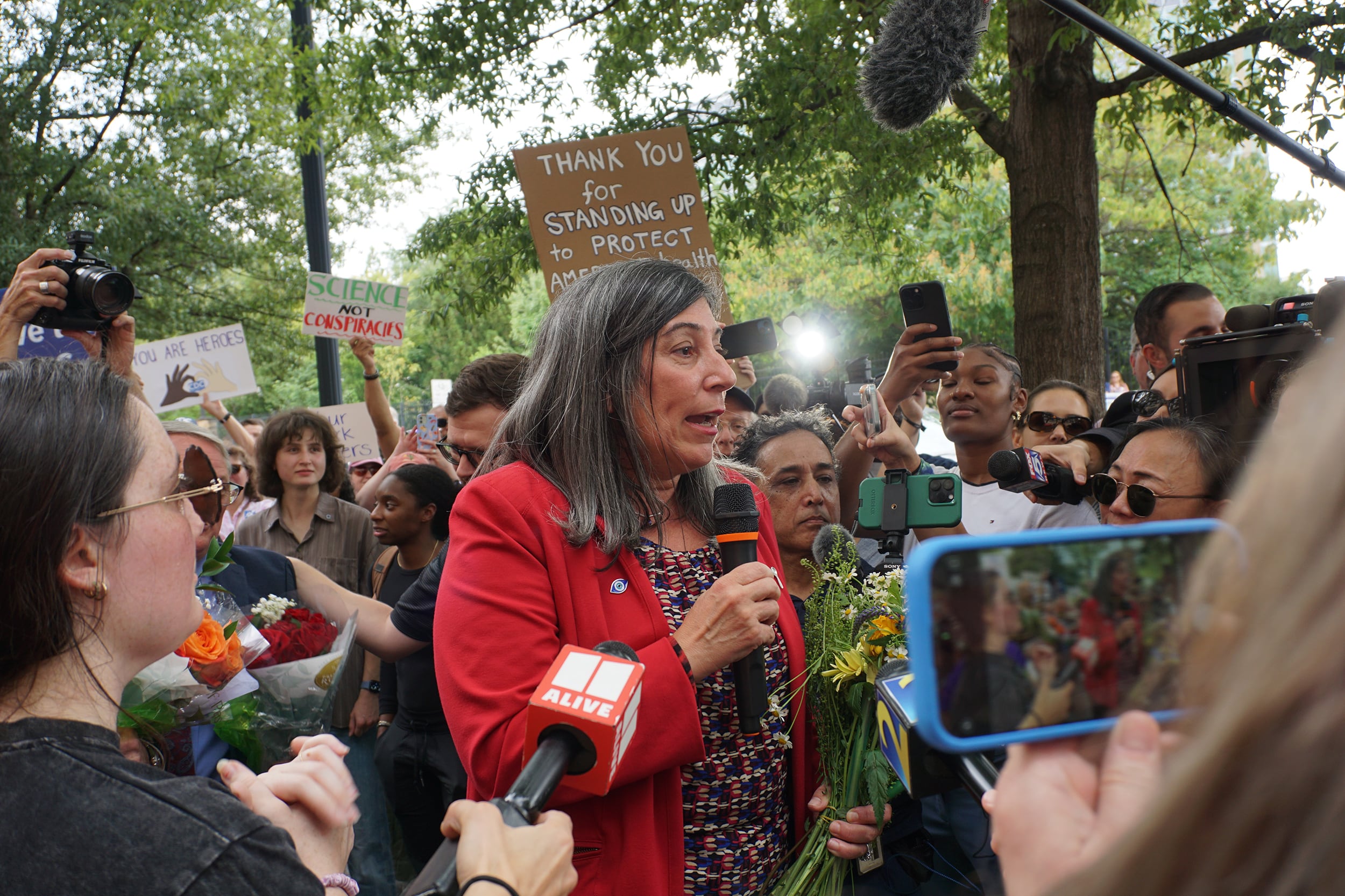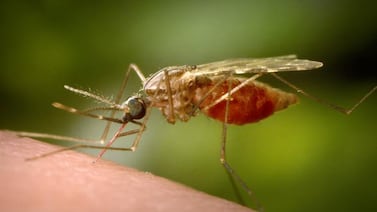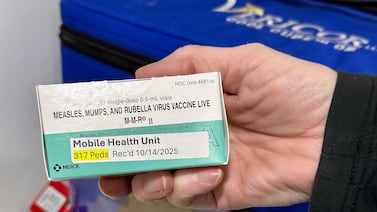Public health, explained: Sign up to receive Healthbeat’s free Atlanta newsletter here.
Three senior leaders walked out of the Centers for Disease Control and Prevention on Thursday in Atlanta after resigning over their opposition to the Trump administration’s political interference in the agency’s science-backed work.
Dr. Demetre Daskalakis, director of the National Center for Immunization and Respiratory Diseases; Dr. Deb Houry, chief medical officer and deputy director for program and science; and Dr. Dan Jernigan, director of the National Center for Emerging Zoonotic and Infectious Diseases, emerged from the CDC campus greeted by a crowd of supporters and employees.
“I hope this is a tipping point to where we get our public health back, that we get the trust of the nation back, we get the trust of our leaders back, and that public health does the work they’re meant to do on the ground, saving lives,” Houry said.
The three resignations – along with that of Dr. Jennifer Layden, director of the Office of Public Health Data, Surveillance and Technology — announced late Wednesday, came after news that CDC Director Susan Monarez was being ousted after only three weeks on the job.
A week ago, Monarez stood amid shattered glass on the floor of a CDC building where a gunman had fired into the windows and said she wanted to restore trust in the agency and support its workers, whom she called family.
This week’s developments are the latest in a series of blows to the beleaguered agency since the start of President Donald Trump’s second term and the appointment of Robert F. Kennedy Jr. as health secretary. The CDC has faced several rounds of mass layoffs, funding cuts, and the Aug. 8 shooting that resulted in the death of a police officer and the gunman.
Monarez’s attorney, Mark Zaid, said in a post on X that Monarez had “refused to rubber stamp unscientific, reckless directives and fire public health experts” and said Kennedy had weaponized “public health for political gain.” She is fighting her dismissal.
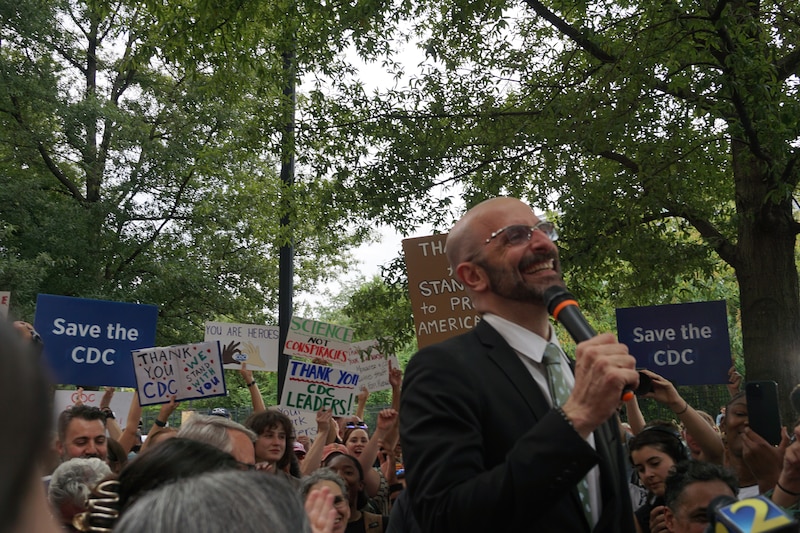
In a resignation letter posted on X, Daskalakis said political interference in the Advisory Committee on Immunization Practices, a part of the CDC, drove his decision to leave.
In June, Kennedy removed all 17 members of the committee and replaced them with his own appointees. That move, as well as the new committee’s decisions about vaccine policies have drawn criticism from scientists and many professional medical organizations.
The committee is expected to rule soon on policies for the latest Covid vaccine, raising fears that many Americans would lose insurance coverage for the shots or be unable to access them altogether. Advocates also worry that the committee will change recommendations for long-established childhood vaccines.
More than 100 CDC supporters and current employees turned out in support of Daskalakis, Houry, and Jernigan. Many workers crossed the street from the agency’s headquarters near Emory, while others drove from other locations in Atlanta to show their support. Several said they and their fellow employees had taken leave so they would not get in trouble for attending the event during the workday.
With many top roles vacant, the CDC is facing a leadership vacuum. The Department of Health and Human Services did not respond to an inquiry about who is the current acting director, or who has taken over the positions of the four other leaders who resigned. The Washington Post reported late Thursday that Deputy HHS Secretary Jim O’Neill would act as interim director.
Houry, Daskalakis, and Jernigan adopted a defiant tone, vowing to fight for remaining CDC employees and scientific integrity.
“America needs to see that you are the people that protect America,” Daskalakis said. “We are going to be your loudest advocates.”
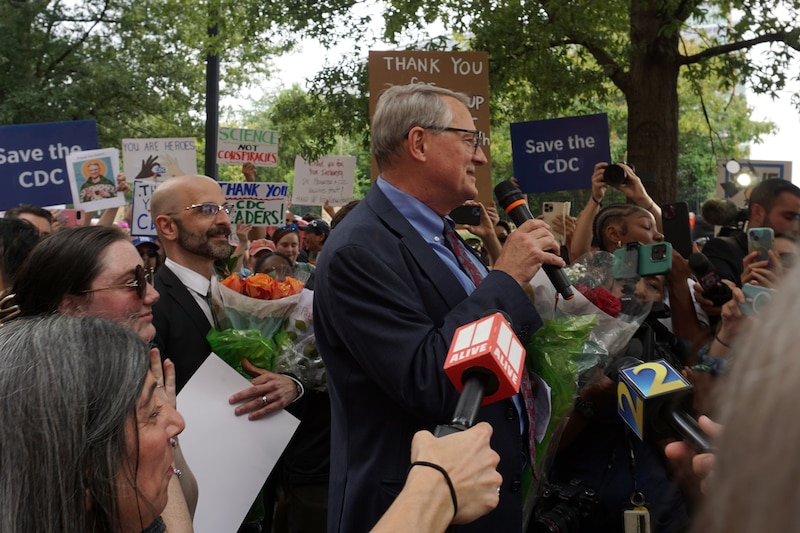
All three criticized political interference in science and public health.
“What makes us great at CDC is following the science, so let’s get the politics out of public health … because that’s how we get to the best decisions for public health,” Jernigan said.
Houry said the three had agreed to act in concert after “talking about it for months.”
“We need to get our people back. We’ve terminated, RIFed, valuable people. We need to support our labs. We need to get our budget for appropriate programs. We can’t lose our chronic disease center,” Houry said, referring to multiple “reductions in force” at the agency over the past few months.
The leaders said the work CDC employees do is important in protecting American health, with Daskalakis pointing to the work the agency has done to “stop Ebola at its source” and Houry pointing to this year’s measles outbreak.
“We have unvaccinated populations and a secretary that promoted vitamins over vaccines,” Houry said.
HHS did not immediately respond to a request for comment.
The instability has disrupted work at the agency, said Dr. Elizabeth Soda, a current CDC employee.
“RFK has created so much chaos,” she said. “I’m not sure what he expected in terms of getting work done.”
CDC retirees who worked at the agency for decades said they are concerned about the impact on Atlanta’s economy and reputation.
“This has been one of the crown jewels of Atlanta. … It’s a point of pride,” said retiree Marta Gwinn.
She doesn’t think the local job market can absorb all of the laid off workers, and Atlanta will lose brain power as professionals and students drawn to the city’s public health institutions, from the CDC to universities like Emory and Georgia State, look elsewhere.
She and fellow retirees Joanne Mei and Laura Fehrs said they also want to hear from state political leaders.
“It’s been pretty much silence, and I don’t understand that,” Mei said. “Where’s our governor who wants to attract all this new science and all these tech companies?”
Rebecca Grapevine is a reporter covering public health in Atlanta for Healthbeat. Contact Rebecca at rgrapevine@healthbeat.org.

